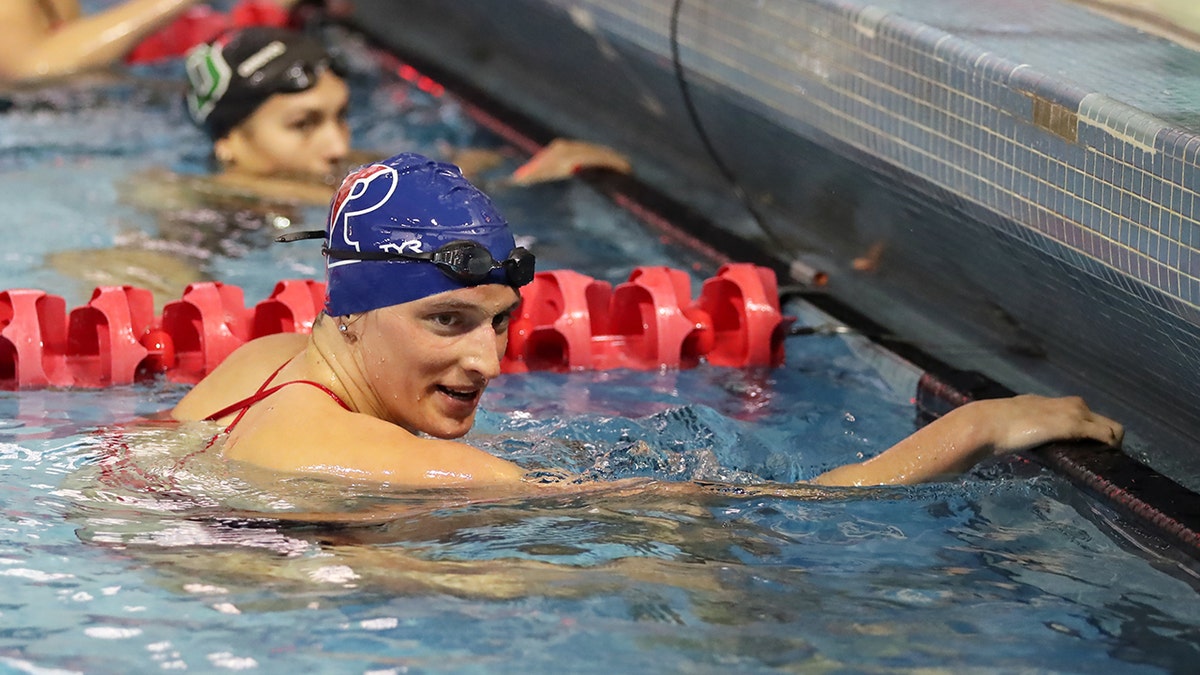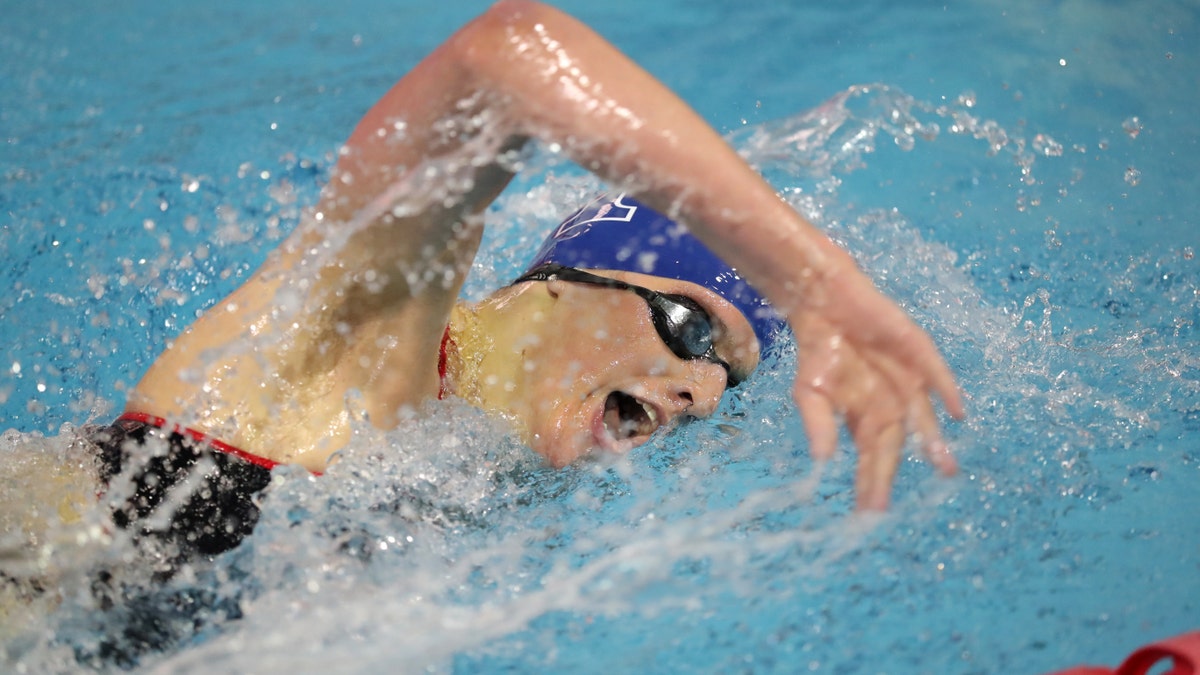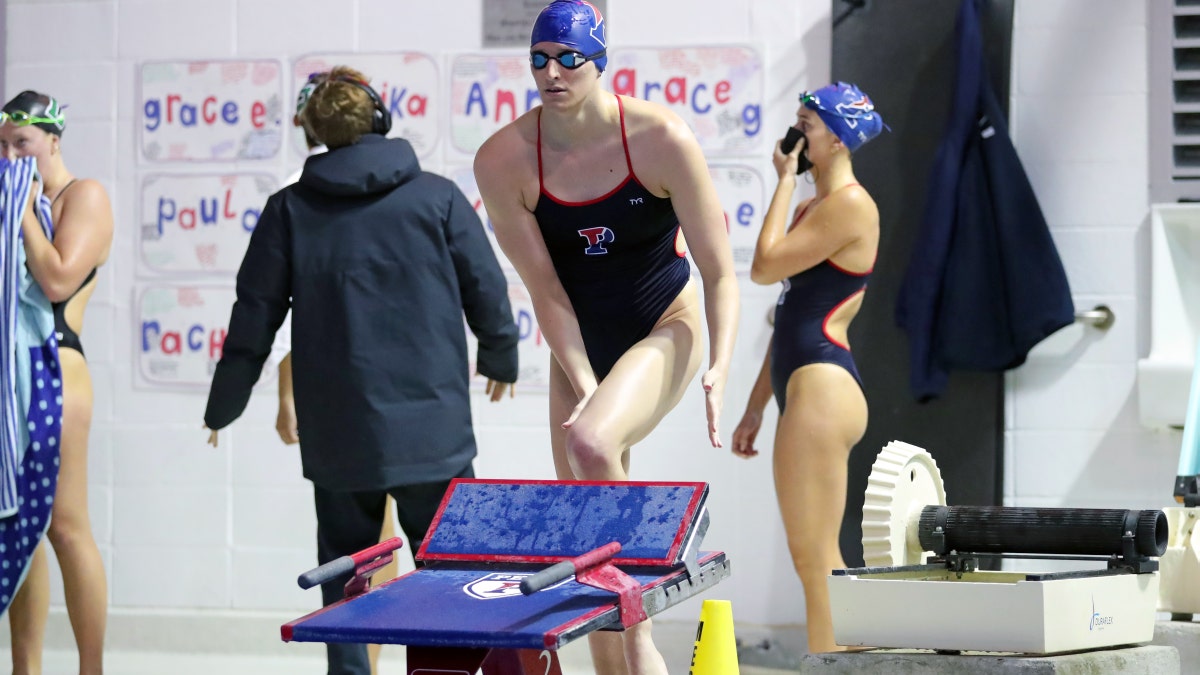Caitlyn Jenner reacts to new NCAA transgender policy: 'Woke world gone wild'
Former Olympian tells 'America Reports' the NCAA only 'kicked the can down the road' with its new policy.
Parents and women’s sports advocates are slamming the National Collegiate Athletic Association (NCAA) for "passing the buck" on its transgender student-athlete policy after the organization announced a change Wednesday on testosterone requirements.
The NCAA Board of Governors voted in support of a sport-by-sport approach to transgender participation, which aligns with recent policy changes from the U.S. and International Olympic Committees and allows each sport’s national governing body to determine its own policy. The NCAA policy previously required trans women athletes to undergo at least a year of testosterone suppression treatment before competing on a women’s team.
If a sport does not have a national governing body, that sport’s international federation policy would be followed. If there is no international federation policy, the International Olympic Committee (IOC) rules would take place.

Lia Thomas of the Pennsylvania Quakers smiles after winning the 200-meter freestyle event during a tri-meet against the Yale Bulldogs and the Dartmouth Big Green at Sheerr Pool on the campus of the University of Pennsylvania on Jan. 8, 2022, in Philadelphia. (Hunter Martin/Getty Images)
The change comes amid mounting criticism from parents and women’s sports advocates who warn that the future of women’s sports is in danger if transgender swimmer Lia Thomas of the University of Pennsylvania is allowed to keep competing on the women’s team. The governing body in her case is USA Swimming, which does not have a formal policy regarding transgender athletes, so the IOC rules, which have no testosterone requirements, will be followed until and unless USA Swimming and/or the International Swimming Federation (FINA) announce a new policy.
A parent of one of Thomas’ teammates, who spoke to Fox News Digital on the condition of anonymity out of concerns of possible retaliation against his daughter, said his daughter and "a good number" of her teammates feel they're no longer able to compete fairly with Thomas on the team and that there's been a lot of "crying on the pool deck" over the situation.
"They don’t agree with what Lia’s doing and they’re really unhappy with the situation," he said. "Morale is bad."
He said the NCAA rule change is a "cop-out" and that USA Swimming should step up to the plate and tighten the rules.
"The onus is now on USA Swimming to do something, and it’s my hope they have the courage to do the right thing and put stricter limits than what the current IOC policy states," he said, adding that it’s important to set the standard not only for college and elite sports but for youth swimmers as well.
"USA Swimming oversees all swimming in the United States, and I think if they really have courage they could craft a policy in such a way that tells little girls that USA Swimming has their best interests as well – that USA Swimming doesn't only care about collegiate swimmers and international swimmers and so forth," he said. "Because this is a situation that could potentially affect hundreds and thousands of kids."
The father said his daughter, who has been swimming since age 5, is "angry that she’s in this situation" and has "lost opportunities as a result of it," such as losing spots on relay competitions.
"She has given this sport everything she has, and she feels like some of it’s been taken away," he said.

Lia Thomas of the Pennsylvania Quakers swims in the 500-yard freestyle event during a tri-meet against the Yale Bulldogs and the Dartmouth Big Green at Sheerr Pool on the campus of the University of Pennsylvania on Jan. 8, 2022, in Philadelphia. (Hunter Martin/Getty Images)
The dad said he’s worried that if the rules go unchanged it will ultimately lead to taking scholarships and educational opportunities from biological women.
Another problem, he said, is that many of the girls on Thomas' team are "without a doubt" afraid to speak out, because "any kind of opposition is immediately called transphobic."
"Nobody wants to be labeled that way and have their future threatened," he said.

Lia Thomas of the Pennsylvania Quakers gets ready to compete in a freestyle event during a tri-meet against the Yale Bulldogs and the Dartmouth Big Green at Sheerr Pool on the campus of the University of Pennsylvania on Jan. 8, 2022, in Philadelphia. (Hunter Martin/Getty Images)
Critics of the current rules argue that athletes like Thomas should be placed in a separate category for trans athletes, or that competitions featuring a trans athlete should be designated as "exhibition contests," which has to be agreed to by both competing institutions and would mean their times would not count as records and their place would not count as team points.
Others have called for changing the male category to "Open" and the women’s category to "Female," where female refers to the sex recorded at birth.
Their reasoning is that multiple studies have shown in recent years that transgender women athletes who went through a typical male puberty during adolescence still hold a competitive edge over their biologically female competitors, and that there isn’t enough existing research to conclude how long one must undergo testosterone suppression to even the playing field among trans and cisgender, or non-transgender, women.
Nancy Hogshead-Makar, a three-time Olympic gold medalist swimmer and chief executive of the advocacy group Champion Women, ripped the NCAA’s decision Wednesday.
"The new NCAA policy sounds a lot like the old one," she told ESPN. "The board hasn't resolved the intractable balancing between fairness, playing safety and inclusion. They failed women by not prioritizing fairness."
Linda Blade, a Canada-based sports performance coach and kinesiologist, who has been outspoken on the issue, tweeted: "This is exactly as I predicted. Rather than working diligently to create a comprehensive & sensible policy… Pass the buck to each individual #sport governing body. And, weirdly, invoke the 2015 #IOC policy which is exactly the SAME policy as #LiaThomas used!! #NCAA #COWARDS."
The College Swimming & Diving Coaches Association of America (CSCAA) said it stands by Thomas competing, and called on the NCAA Division I Competition Oversight Committee to expand the 2022 championship participation cap by one spot.
The CSCAA also criticized the NCAA for passing the buck.
"Yesterday’s Board of Governors’ decision is not a solution," the College Swimming & Diving Coaches Association of America said in a statement. "The NCAA’s previous policy on transgender participation, while pioneering, was outdated and yesterday’s decision is a missed opportunity to lead this important discussion."
There’s also a level of confusion on what the NCAA rule change will mean specifically for women’s swimming. The requirement that’s posted on usaswimming.org is outdated, citing "current IOC guidelines" that were abandoned in November, Forbes reported.
The old IOC standards had required trans female athletes to demonstrate a total testosterone level in serum below 10 nmol/L for at least 12 consecutive months prior to competing on a women’s team, but that rule was abandoned in November in favor of a sport-by-sport approach.
A spokesperson from the NCAA clarified to SwimSwam.com that the "previously established IOC policy criteria" refers to the November 2021 framework, which doesn’t have specific rules about testosterone suppression.
"In other words, at present, for swimming, this means that there is now no testosterone suppression requirement, as neither FINA nor USA Swimming have published one," SwimSwam.com reported.
CLICK HERE TO GET THE FOX NEWS APP
USA Swimming issued a statement Thursday provided to Fox News Digital that said it would follow the lead of FINA, which it said will be releasing a new policy shortly.
"In 2018, we established athlete inclusion procedures, which included both a process by which an athlete could change their competition category consistent with their gender identity and criteria for athletes qualifying for or competing in elite-level competitions (including those competition time qualifications such as Juniors, Nationals and U.S. Open), which adhered to previous International Olympic Committee guidelines," the statement read, in part. "This policy also importantly provides for individual athlete consideration."
"The non-elite athlete inclusion procedures remain unchanged," it continued. "Following broad transgender policy changes in Nov. 2021, the IOC now requires International Federations to create their own sport-specific eligibility requirements, and so we have been proactively working with FINA for several months to help shape and support their policy development efforts. We believe they will release a new policy shortly, which we will adopt for elite-level competitions."













































